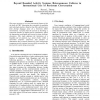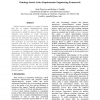727 search results - page 44 / 146 » A theoretical framework for multiple neural network systems |
INFOCOM
2010
IEEE
13 years 7 months ago
2010
IEEE
—Generating a secret key between two parties by extracting the shared randomness in the wireless fading channel is an emerging area of research. Previous works focus mainly on si...
HICSS
2000
IEEE
14 years 1 months ago
2000
IEEE
This paper proposes a two-level theoretical framework for the study of CMC illustrating the principles of mediation and contextual analysis. Based on log files and interviews from...
APSEC
2005
IEEE
14 years 2 months ago
2005
IEEE
Software-intensive systems are systems of systems that rely on complex interdependencies among themselves as well as with their operational environment to satisfy the required beh...
FLAIRS
2007
13 years 11 months ago
2007
Context-sensitive Multiple Task Learning, or csMTL, is presented as a method of inductive transfer that uses a single output neural network and additional contextual inputs for le...
IJCNN
2006
IEEE
14 years 2 months ago
2006
IEEE
— The optimization of classification systems is often confronted by the solution over-fit problem. Solution over-fit occurs when the optimized classifier memorizes the traini...


